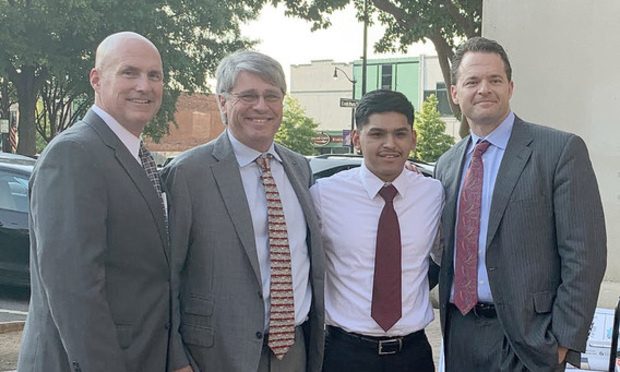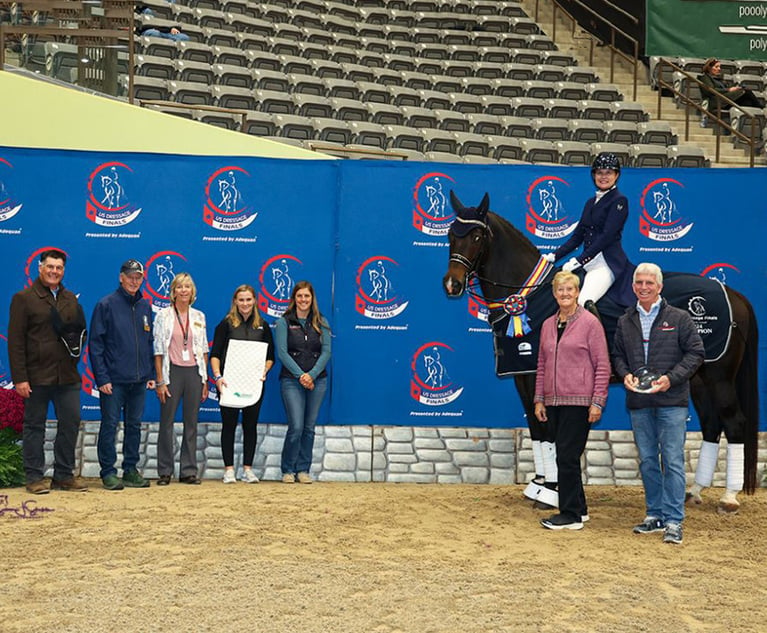'Bubble Soccer' Injury Ends in $4.6M Verdict After Defense Rejected $1M Settlement
The defense tried to shift the blame to the teen who suffered a brain injury after running into another student.
September 13, 2019 at 03:19 PM
6 minute read
 Brad Thomas (from left), William Curtis, plaintiff Salvador Quezada and Michael Goldberg (Courtesy photo)
Brad Thomas (from left), William Curtis, plaintiff Salvador Quezada and Michael Goldberg (Courtesy photo)
A Cobb County jury awarded more than $4.6 million to a man who suffered a brain injury while playing "bubble soccer" as part of his high school soccer team's year-end celebration, a verdict that came after the defense rejected a $1 million settlement offer.
Salvador Reyes, now 21, was a senior at Campbell High School and a member of the varsity soccer team when the incident occurred a couple of weeks before graduation in 2016.
"It was a year-end sports banquet for the soccer team, and they decided that instead of typical banquet, they'd like to do something fun, so they had a bubble soccer game," said attorney Brad Thomas.
In bubble soccer, players are outfitted with clear, inflated plastic bubbles covering their heads to below their waists.
"They had four kids on one team and four more behind an inflatable goal, and they basically just counted down '1, 2, 3' and they ran into each other," Thomas said.
"We said they shouldn't have had them so far apart. He ran into another kid and was knocked unconscious," said Thomas, who tried the case with fellow Fried Rogers Goldberg partner Michael Goldberg and Bill Curtis of Smyrna's William H. Curtis Law Office.
Reyes sustained a fractured skull "and was home for a month while a prosthetic plate was being made, then he went back for another surgery to have it put in," Thomas said.
Reyes suffered an injury to his brain's frontal lobe, which left him with "impulsiveness issues and mood changes," Thomas said.
"He can't remember things like he used to, and he lost his sense of taste and smell," Thomas said.
In an effort to taste his food, "Reyes douses everything with heavy spices to get a sense of heat off the peppers," Thomas said.
Reyes, who still lives with his family, has accrued nearly $120,000 in medical bills so far, Thomas said.
A few months after the accident, Reyes sued the event company that was hired to provide the bubble soccer equipment, Game Truck Georgia, in Cobb County State Court. Reyes claimed the company failed to warn him of the dangers posed by the game and failed to provide any supervision or physical parameters.
The "lack of any safety instructions provided Mr. Reyes with a false sense of security and protection," the complaint said.
Game Truck attorney Craig White of Skedsvold & White did not respond to a request for comment, but the defense portion of the pretrial order said participants were instructed to keep the "bubble suit" straps on their shoulders and hold onto the handles and not to charge or "bull rush" other players.
Reyes showed up late, it said, and missed the initial safety briefing but was instructed on safely wearing the suit.
Reyes "was injured when he charged at high speed toward another participant of the soccer match in which he was engaged," it said.
Reyes assumed the risk and was responsible, at least in part, for his own injuries, the defense account said.
Thomas said there was a demand for the company's $1 million insurance policy limit last year, which was declined. Mediation was also unsuccessful.
"Their highest offer was $355,000 a week before trial," Thomas said.
During a trial that began Monday before Judge Carl Bowers, Thomas said the defense attempted to use Reyes' subsequent return to the job market—he has worked at the Smyrna Department of Sanitation, as a carpenter, attended barber school and now clerks at a convenience store—to show he has recovered from his injuries.
"That was the real issue," Thomas said. "The defense argument was, 'he's back functioning.' Our argument was, 'Yes, he's functioning, but his quality of life has suffered and will continue to suffer.'"
Thomas said the key plaintiff's expert was Brian Avery, a lecturer in entertainment risk management at the University of Florida in Gainesville. The defense called no expert witnesses.
Thomas said that in closing, he asked jurors to award "right at $15 million, based on the fact that he was so young when this happened."
On Wednesday afternoon, the jury took just over two hours to award $5 million in damages but apportioned 7% of the liability to Reyes for a total award of $4.65 million.
The lawyers did not speak to jurors afterward, but Thomas said the verdict should be a wake-up call to insurers and defense lawyers.
"Brain injury cases are often undervalued by insurance companies, but juries, even in conservative venues like Cobb County, understand how brain injuries change everything about a person," he said.
He also praised the panel for not allowing his client's Mexican American heritage to sway their ruling.
"Even though we always hear about how hard it is to get a verdict for a Hispanic client in a conservative venue, we were not worried about Salvador's ethnicity," he said. "We knew that Cobb County jurors could see past any bias if you just confronted it head-on in jury questioning."
Plus, he added, "a jury couldn't help but like a teenager who went to work and got a job just eight months after suffering such a horrific injury."
This content has been archived. It is available through our partners, LexisNexis® and Bloomberg Law.
To view this content, please continue to their sites.
Not a Lexis Subscriber?
Subscribe Now
Not a Bloomberg Law Subscriber?
Subscribe Now
NOT FOR REPRINT
© 2025 ALM Global, LLC, All Rights Reserved. Request academic re-use from www.copyright.com. All other uses, submit a request to [email protected]. For more information visit Asset & Logo Licensing.
You Might Like
View All


'It Refreshes Me': King & Spalding Privacy Leader Doubles as Equestrian Champ
5 minute read
Federal Judge Rejects Teams' Challenge to NASCAR's 'Anticompetitive Terms' in Agreement
Trending Stories
- 1Uber Files RICO Suit Against Plaintiff-Side Firms Alleging Fraudulent Injury Claims
- 2The Law Firm Disrupted: Scrutinizing the Elephant More Than the Mouse
- 3Inherent Diminished Value Damages Unavailable to 3rd-Party Claimants, Court Says
- 4Pa. Defense Firm Sued by Client Over Ex-Eagles Player's $43.5M Med Mal Win
- 5Losses Mount at Morris Manning, but Departing Ex-Chair Stays Bullish About His Old Firm's Future
Who Got The Work
J. Brugh Lower of Gibbons has entered an appearance for industrial equipment supplier Devco Corporation in a pending trademark infringement lawsuit. The suit, accusing the defendant of selling knock-off Graco products, was filed Dec. 18 in New Jersey District Court by Rivkin Radler on behalf of Graco Inc. and Graco Minnesota. The case, assigned to U.S. District Judge Zahid N. Quraishi, is 3:24-cv-11294, Graco Inc. et al v. Devco Corporation.
Who Got The Work
Rebecca Maller-Stein and Kent A. Yalowitz of Arnold & Porter Kaye Scholer have entered their appearances for Hanaco Venture Capital and its executives, Lior Prosor and David Frankel, in a pending securities lawsuit. The action, filed on Dec. 24 in New York Southern District Court by Zell, Aron & Co. on behalf of Goldeneye Advisors, accuses the defendants of negligently and fraudulently managing the plaintiff's $1 million investment. The case, assigned to U.S. District Judge Vernon S. Broderick, is 1:24-cv-09918, Goldeneye Advisors, LLC v. Hanaco Venture Capital, Ltd. et al.
Who Got The Work
Attorneys from A&O Shearman has stepped in as defense counsel for Toronto-Dominion Bank and other defendants in a pending securities class action. The suit, filed Dec. 11 in New York Southern District Court by Bleichmar Fonti & Auld, accuses the defendants of concealing the bank's 'pervasive' deficiencies in regards to its compliance with the Bank Secrecy Act and the quality of its anti-money laundering controls. The case, assigned to U.S. District Judge Arun Subramanian, is 1:24-cv-09445, Gonzalez v. The Toronto-Dominion Bank et al.
Who Got The Work
Crown Castle International, a Pennsylvania company providing shared communications infrastructure, has turned to Luke D. Wolf of Gordon Rees Scully Mansukhani to fend off a pending breach-of-contract lawsuit. The court action, filed Nov. 25 in Michigan Eastern District Court by Hooper Hathaway PC on behalf of The Town Residences LLC, accuses Crown Castle of failing to transfer approximately $30,000 in utility payments from T-Mobile in breach of a roof-top lease and assignment agreement. The case, assigned to U.S. District Judge Susan K. Declercq, is 2:24-cv-13131, The Town Residences LLC v. T-Mobile US, Inc. et al.
Who Got The Work
Wilfred P. Coronato and Daniel M. Schwartz of McCarter & English have stepped in as defense counsel to Electrolux Home Products Inc. in a pending product liability lawsuit. The court action, filed Nov. 26 in New York Eastern District Court by Poulos Lopiccolo PC and Nagel Rice LLP on behalf of David Stern, alleges that the defendant's refrigerators’ drawers and shelving repeatedly break and fall apart within months after purchase. The case, assigned to U.S. District Judge Joan M. Azrack, is 2:24-cv-08204, Stern v. Electrolux Home Products, Inc.
Featured Firms
Law Offices of Gary Martin Hays & Associates, P.C.
(470) 294-1674
Law Offices of Mark E. Salomone
(857) 444-6468
Smith & Hassler
(713) 739-1250






